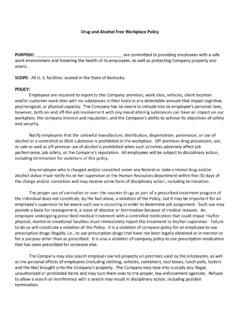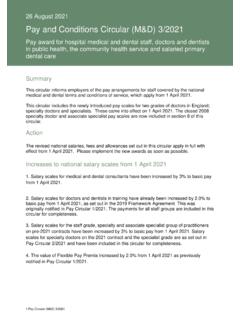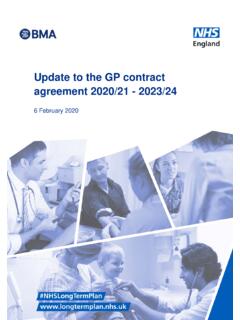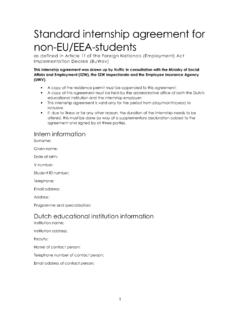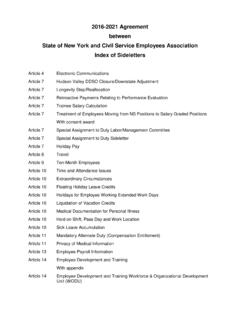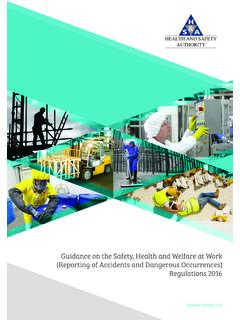Transcription of An Overview of Kentucky's Workers Compensation Law
1 An Overview of Kentucky's Workers Compensation Law Dwight T. Lovan, CommissionerDwight T. Lovan, CommissionerDepartment of WorkersDepartment of Workers ClaimsClaimsIntroductionHistory of Workers CompensationHistory of Workers Compensation1909-1910:First Workers Compensation Statutes. Wisconsin is generally viewed as first :First Kentucky Workers Compensation Act. It was declared unconstitutional because it violated a portion of the Kentucky Constitution prohibiting impairment of Compensation for personal injury. 1916:Reenacted with a voluntary acceptanceprovision for employees today we have voluntary responsibility of workplace injuries and diseases on industry in which it occurred rather than with the general Legislation or Tort ReformBothBoth1. Social Legislation: No fault medical and income benefits. More certainty and expeditious in the delivery of Tort Reform: Exclusivity and replaced some master servant liability.
2 Can t sue in civil action for general compensatory damage; Can t sue fellow employees (KRS ). Limitation of SpecificFederal Employer s Liability Act, FELA (Railroads)Longshore-Harbor Workers Act ( Workers on shore)Federal Worker s Compensation (TVA)Federal GovernmentFederal Federal GovernmentGovernmentEvery State, Federal Government is Act (Crew members on waterway vessels) is an employer1. Any person or entity with one or more employees2. Includes state, city, is an employer KRS is an employer KRS following shall constitute employers mandatorily subject to, and required to comply with, the provisions of this chapter:(1)Any person, other than one engaged solely in agriculture, that has in this state one (1) or more employees subject to this chapter.(2)The state, any agency thereof, and eachcounty, city of any class, school district, sewer district, drainage district, taxdistrict, public or quasipublic corporation,or any other political subdivision or political entity of the state that has one (1) or more employees subject to this is an employeea.
3 Anyone working under contract for hire, expressed or impliedb. Executive officers of corporationsc. State, county or city employeesd. Volunteer firefighterse. Those who sell and deliver newspapersf. Any person performing services in a trade profession or is an employee KRS is an employee KRS following shall constitute employeessubject to the provisions of this chapter, except as exempted under KRS :1) Every person, including a minor, whether lawfully or unlawfully employed, in the service of an employer under any contract of hire or apprenticeship, express or implied, and all helpers and assistants of employees, whether paid by the employer or employee, if employed with the knowledge, actual or constructive, of the employer; 2) Every executive officer of a corporation; is an employee KRS is an employee KRS ) Every person in the service of the state or any of its political subdivisions or agencies, or of any county, city of any class, school district, drainage district, tax district, public or quasipublic corporation, or other political entity, under any contract of hire, express or implied, and every official or officer of those entities, whether elected or appointed, while performing his official duties shall be considered an employee of the state.
4 Every person who is a member of a volunteer ambulance service, fire, or police department shall be deemed, for the purposes of this chapter, to be in the employment of the political subdivision of the state where the department is organized. Every person who is a regularly-enrolled volunteer member or trainee of an emergency management agency, as established under KRS Chapters 39A to 39E, shall be deemed, for the purposes of this chapter, to be in the employment of this state. Every person who is a member of the Kentucky National Guide, while the person is on state active duty as defined in KRS 38:010(4), shall be deemed, for the purposes of this chapter, to be in the employment of the state; is an employee KRS is an employee KRS ) Every person performing service in the course of the trade, business, profession, or occupation of an employer at the time of the injury; and5) Subject to the provisions in subsection (4) of this section, every person regularly selling or distributing newspapers on the street or to customers at their homes or places of business.
5 For the purposes of this chapter, the person shall be deemed an employee of an independent news agency for whom he is selling or distributing newspapers, or, in the absence of an independent agency, of each publisher whose newspapers he sells or is exempta. Agriculture employers/employeesb. Domestic worker in private home if less than two (must work less than 40 hours per week)c. Working for sustenance if with charitable or religious organizationd. Covered by Federal Acte. Voluntary carpoolsg. Certain religious organizationsh. All can voluntarily acceptKentuckyThe following employees are exempt from the coverage of this person employed as a domestic servant in a private home by an employer who has less than two (2) employees each regularly employed forty (40) or more hours a week in domestic servant person employed, for not exceeding twenty (20) consecutive work days, to do maintenance, repair, remodeling, or similar work in or about the private home of the employer, or if the employer has no other employees subject to this chapter, in or about the premises where that employer carriers on his trade, business, or person performing services in return for aid or sustenance only, received from any religious or charitable person for whom a rule of liability for injury or death is provided by the laws of the United States, except those persons covered under Title IV, Public Law 91-173, 91stCongress, commonly referred to as the Black Lung Benefits of the Federal Coal Mine Health and Safety Act of 1969, or as is exempt KRS ; is exempt KRS.
6 KentuckyThe following employees are exempt from the coverage of this person employed in person who would otherwise be covered but who elects not to be covered in accordance with the administrative regulations promulgated by the executive person participating as a driver or passenger in a voluntary vanpool or carpool program while that person is on the way to or from his place of employment . For the purposes of this subsection, carpool or vanpool means any method by which two (2) or more employees are transported from their residences to their places of of a religious sect or division that is an adherent of established tenets or teachings by reason of which members are conscientiously opposed to acceptance of the benefits of any public or private insurance which makes payments in the event of death, disability, old age, or retirement, or makes payments toward the cost of, or provides services for, medical bills, including the benefits of any insurance systems established by the Federal Social Security Act, 42 sec.
7 301 et seq., and it is the practice, and has been for ten (10) years, for members of the sect or division to make reasonable provisions for their dependent is exempt KRS ; is exempt KRS ; employer who has in his employment any employee exempted under KRS may elect to be subject to this chapter. This election on the part of the employer shall be made by the employer securing the payment of Compensation to these exempted employees in accordance with KRS Any employee, otherwise exempted under KRS , of the employer shall be deemed to have elected to come under this chapter, if at the time of the injury for which liability is claims, his employer has in force an election to be subject to this chapter with respect to the employment in which the employee was injured and the employee has not, either upon entering into employment or within five (5) days after the filing of an election by the employer given to his employer and to the executive director notice in writing that he elects not to be subject to this employer within the scope of subsection (1) of this section, within five (5)
8 Days after securing the payment of Compensation in accordance with KRS , shall give the executive director written notice of his election to be subject to this chapter. The employer shall post and keep posted on the premises where any employee or employees, otherwise exempted under KRS , works, printed notices furnished by the executive director stating his acceptance of this chapter. Failure to give notices required by this paragraph shall not void or impair the employer s election to be subject to or relieve him of any liability under this acceptance KRS acceptance KRS employer who has complied with subsection (2) of this section may withdraw his acceptance of this chapter, by filing written notice with the executive director of the withdrawal of his acceptance. A withdrawal shall become effective 60 days afterthe filing of notice or on the dateof the termination of the security for payment of Compensation , whichever last occurs.
9 The withdrawal shall not be effectiveuntil the employer shall theretofore post notice of thewithdrawal where the affected employee or employees work or shall otherwise notify the employees of acceptance KRS acceptance KRS Who is liable and must have Workers Compensation employerb. Up the ladder coverageKentucky1. Every employer subject to this chapter shall be liable for Compensation for injury, occupational disease, or death without regard to fault as a cause of the injury, occupational disease, or death. 2. A contractor who subcontracts all or any part of a contract and his carrier shall be liable for the payment of Compensation to the employees of the subcontractor unless the subcontractor primarily liable for the payment of such Compensation has secured the payment of Compensation as provided for in this chapter. Any contractor or his carrier who shall become liable for such Compensation may recover the amount of such Compensation paid and necessary expenses from the subcontractor primarily liable therefor.
10 A person who contracts with another: (a)To have work performed consisting of the removal, excavation, or drilling of soil, rock, or mineral, or the cutting or removal of timber from land; or (b)To have work performed of a kind which is a regular or recurrent part of the work of the trade, business, occupation, or profession of such person shall for the purposes of this section be deemed a contractor, and such otherperson a subcontractor. This subsection shall not apply to the owner or lessee of land principally used for agriculture. is liable KRS is liable KRS Kentucky3. Liability for Compensation shall not apply where injury, occupational disease, or death to the employee was proximately caused primarily by voluntary intoxication as defined in KRS , or by his willful intention to injure or kill himself or another. 4. If injury or death results to an employee through the deliberate intention of his employer to produce such injury or death, the employee or his dependent as herein defined shall receive the amount provided in this chapter in a lump sum to be used, if desired, to prosecute the employer.
